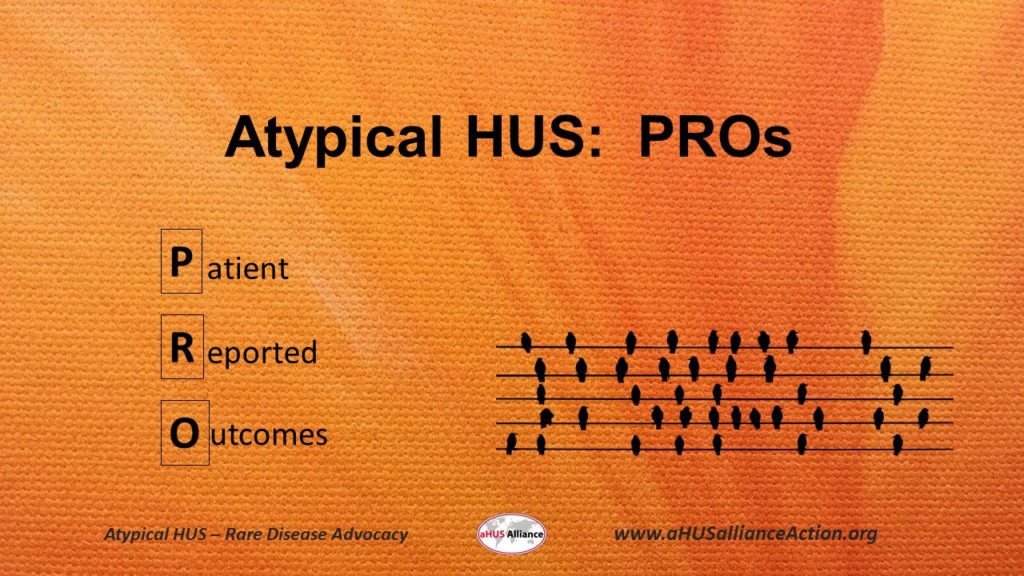
Who, or what, are atypical HUS PROs: are these people, concepts, or initiatives?
In medical terminology PRO stands for ‘Patient Reported Outcomes’ and refers to comments made directly and in the patients’ own words, providing insight into patient experiences and viewpoints without interpretation by others. PROs capture what matters most to actual patients by offering their authentic and unfiltered version of meeting challenges and living lives that go beyond clinical settings surrounding aHUS diagnosis and treatment. In other words, PROs get to the heart of patient care and quality of life with patient–reported status in areas of physical and mental health but also impact on daily life or well-being aspects such as social concerns, treatment satisfaction, and disease burdens such as economic stressors.
Whether terminonolgy appears as ‘patient centered care’ or ‘patient centric approaches’, what should stand out is an emphasis on patients, as they and their families are truly ‘atypical HUS PROs’. Patients and aHUS family caregivers should be considered as ‘pros’ or experts in disease treatment and management issues, for who else can provide first-hand knowledge about living with atypical HUS and what it’s like both during and after acute aHUS episodes? It’s vital that patients and family caregivers be included alongside those who offer dedicated care and medical advancements. They’re more widely recognized as credentialed aHUS professionals who are experts in aHUS/TMA, but together with patient views we can create a synergistic picture where the sum is greater than its parts. Since aHUS can occur with wide variations in event duration, severity, and organ damage, PROs must consider various scenarios and types of patient experiences. Development of aHUS PRO tools must include all aspects of care and daily life, with varied viewpoints of patients to include those who: are on dialysis, experience long-term aHUS versus short infrequent episodes, consider discontinuing treatment, had a transplant, are concerned about relapse, are genetically predisposed but without disease activity, had pregnancy-related aHUS, and many more groups.
While there’s always been interest in getting patient opinions, holistic PROs aren’t yet common in clinical practice, research, or clinical trials. There’s still a need to create methods and tools to collect meaningful but measurable patient-reported data which can help medical professionals, academics, and others gain insight into myriad aspects which affect aHUS patients. Unfortunately marketing and communication teams tend to ‘lump’ all rare disease patients as a group assumed to have similar characteristics, despite concise articles which describe reasons why aHUS isn’t like other rare disease populations and overviews which detail existing barriers to aHUS clinical trials. Two of the 5 sections of the Global aHUS Patients’ Research Agenda reflect patients’ interest in the clinical, psychological and social-economic impact of having aHUS. (6 of 15 items, sections 4 & 5). Patients and family caregivers want to, and can, help build brighter futures for those with this rare disease.
Here’s a bevy of aHUS-specific content regarding why PROs are so important to defining and refining everything within the aHUS space, from developing new treatments to establishing best practice guidelines or ‘standards of care’ to improving the quality of life for patients.
PROs & the aHUS Global Patient Registry: How are You Doing? (our 4 part series)
(2)- PRO reporting in practice
aHUS and Clinical Trials
Breaking down Barriers in aHUS Clinical Trials
2020 aHUS Therapeutic Drug Landscape: Overview
aHUS Community
Atypical HUS: Not Like the Others
The role of Positive Health in the Dutch approach to aHUS
Perspectives
Experiencing aHUS – Viewpoints & Variations
Living with aHUS: What would you Say?
Patient Engagement
It’s time to Re-define aHUS Patient Engagement
Rare Disease Day 2022 – aHUS Patient Questions
aHUS Advocacy – Punching above our Weight
Specific Topics -PROs
aHUS Health, Well Being, and Work
It’s not about my Rare Disease
Mental Health: aHUS community during the Pandemic
Eculizumab aHUS Treatment: PESaM
The role of Positive Health in the Dutch approach to aHUS
aHUS Patient Experiences: the Diagnostic Journey – 2021: 42 question global POLL (N=227) Results: 4 Reports https://bit.ly/aHUS2021pollData
For many more Articles & Resources, visit our
Atypical HUS Resources page of our Info Centre
